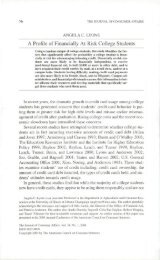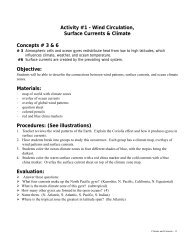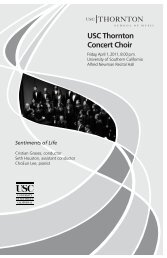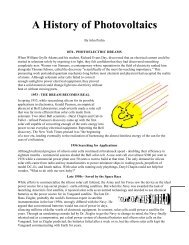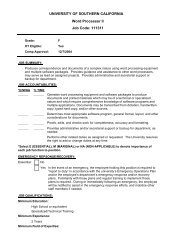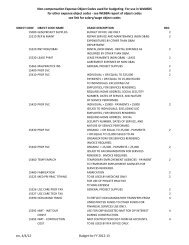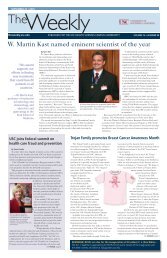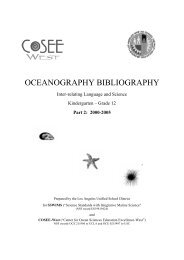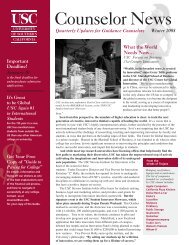Arnold Heidsieck Kafka's Fictional and Non-Fictional Treatments of ...
Arnold Heidsieck Kafka's Fictional and Non-Fictional Treatments of ...
Arnold Heidsieck Kafka's Fictional and Non-Fictional Treatments of ...
Create successful ePaper yourself
Turn your PDF publications into a flip-book with our unique Google optimized e-Paper software.
<strong>Arnold</strong> <strong>Heidsieck</strong><br />
<strong>Kafka's</strong> <strong>Fictional</strong> <strong>and</strong> <strong>Non</strong>-<strong>Fictional</strong> <strong>Treatments</strong> <strong>of</strong> Administrative, Civil, <strong>and</strong> Criminal Law<br />
[Abstract: Kafka studied these three branches <strong>of</strong> law with several then-prominent academic teachers.<br />
But it was his extra-mural association with the legal philosopher Oskar Kraus, a philosophy lecturer at<br />
the University <strong>of</strong> Prague, that gave him a firm grasp <strong>of</strong> how modern liberal law emerged from the<br />
Aristotelian, Roman, <strong>and</strong> Christian concepts <strong>of</strong> natural <strong>and</strong> rational law.]<br />
<strong>Kafka's</strong> works reveal his interest in the complex interrelationships <strong>of</strong> constitutional, civil,<br />
administrative, <strong>and</strong> criminal law with the history <strong>of</strong> law <strong>and</strong> with moral thought. He studied these<br />
four branches <strong>of</strong> law with several then-prominent academic teachers. But it was his extra-mural<br />
association with the legal philosopher Oskar Kraus, 1 a philosophy lecturer at the University <strong>of</strong> Prague,<br />
that gave him a firm grasp <strong>of</strong> how modern liberal law emerged from the Aristotelian, Roman, <strong>and</strong><br />
Christian concepts <strong>of</strong> natural <strong>and</strong> rational law. Kafka‘s early stories ―The Judgment‖ <strong>and</strong> ―The<br />
Metamorphosis‖ do not refer to any statutory laws; they explore interpersonal ethics <strong>and</strong> the<br />
dynamics <strong>of</strong> power within the family. Amerika moves beyond the circle <strong>of</strong> the family but restricts<br />
the use <strong>of</strong> law to disputes between employer <strong>and</strong> employee that in Austria, for the most part, were<br />
not actionable in civil courts but seen as matters <strong>of</strong> discipline <strong>and</strong> contractual duties. 2 By contrast,<br />
The Trial, ―In the Penal Colony,‖ The Castle, <strong>and</strong> several shorter stories <strong>of</strong> the middle <strong>and</strong> late<br />
periods <strong>of</strong>fer specific examples from the history <strong>of</strong> law <strong>and</strong> jurisprudence. In The Trial, for instance,<br />
the conceptual models run the gamut from procedural, civil, <strong>and</strong> criminal to constitutional <strong>and</strong><br />
natural law. As the last chapter will show, The Castle contemplates the origins <strong>of</strong> societal laws in<br />
1 He met Oskar Kraus in the Louvre Circle or Brentano Club. It consisted <strong>of</strong> doctoral students (among<br />
them <strong>Kafka's</strong> friend Hugo Bergmann) <strong>and</strong> instructors (Oskar Kraus, Alfred Kastil) in philosophy, lawyers<br />
<strong>and</strong> <strong>Kafka's</strong> close literary friends Max Brod <strong>and</strong> Felix Weltsch, among others. Kafka attended its sessions<br />
over several years.<br />
2 Josef Ulbrich, Das österreichische Staatsrecht [H<strong>and</strong>buch des öffentlichen Rechts der Gegenwart, ed.<br />
Georg Jellinek <strong>and</strong> Robert Piloty, vol. 4, pt. 1, sect. 1, pt. 1] (Tübingen: Mohr, 1904) 224. V 32; A 33. V<br />
150; A 181. See also my essay under the link name Kafka Amerika Jurisprudenz on this website. ―The<br />
Judgment‖ <strong>of</strong>fers an analogy to ancient <strong>and</strong> especially Roman law, to a father's absolute legal right over his<br />
son.
the so-called divine law <strong>of</strong> the Judaic-Christian tradition.<br />
One <strong>of</strong> <strong>Kafka's</strong> principal law teachers was Heinrich Singer, a pr<strong>of</strong>essor <strong>of</strong> canon law with<br />
broad constitutional law interests. An important research area <strong>of</strong> his was the early-nineteenth-<br />
century Catholic Koordinations theory, which conceived <strong>of</strong> church <strong>and</strong> state as coordinated<br />
(coequal) sovereign powers. 3 Singer acknowledged the theory's contribution in shaping a Roman<br />
Catholic cultural <strong>and</strong> political movement that was able to curb the post-Napoleonic states' absolutist<br />
control over their citizens. But he also insisted that coordination amounted to a contradictory legal<br />
principle that could never legitimize the rule <strong>of</strong> law. It would turn the relation between state <strong>and</strong><br />
church into an out-<strong>and</strong>-out political struggle, almost like a war between nations. To ensure freedom<br />
<strong>of</strong> conscience for all <strong>and</strong> peace between the religions, the state had to achieve sovereignty based on<br />
individual rights <strong>and</strong> morally sanctioned laws. Although a devout Catholic, Singer was critical <strong>of</strong><br />
Austria-Hungary's concordat (1855) with the Vatican. To avoid a political conflict, the concordat<br />
had surrendered some <strong>of</strong> the empire's legislative sovereignty to the church, which was able to deter-<br />
mine its own relation to the empire as well as to control many institutional issues that traditionally<br />
had been in its domain. For instance, it retained the jurisdiction over all marital matters as well as<br />
the supervision <strong>of</strong> the elementary school system. Kafka was well aware <strong>of</strong> the legal <strong>and</strong> constitu-<br />
tional sovereignty that modern states had won. In a suppressed passage from The Trial, Josef K.<br />
tells one <strong>of</strong> his executioners: ―What if I transferred the trial into the domain where the writ <strong>of</strong> the<br />
state law runs? The outcome might very well be that I would have to defend you two gentlemen<br />
against the state!‖ K. envisions himself in the role <strong>of</strong> a defense counsel on behalf <strong>of</strong> two henchmen<br />
<strong>of</strong> an illegal court system that aspires to compete with the state's criminal jurisdiction. When the<br />
lawyer Huld shows himself informed about K.'s case even before he has met him, <strong>and</strong> K. is briefly<br />
tempted to say to him: ―But you're attached to the Court in the Palace <strong>of</strong> Justice, not the one in the<br />
attics,‖ it implies that the court system is somehow coequal with or rivaling the state's court system.<br />
Just as Singer saw coordination as a product <strong>of</strong> jurisprudential (canonical or natural law) specula-<br />
3 Heinrich Singer, ―Zur Frage des staatlichen Oberaufsichtsrechtes,‖ Deutsche Zeitschrift für Kirchenrecht,<br />
3rd series, 5 (1895): 60–166; 161. During his second year at the university Kafka took eleven weekly hours<br />
with Singer. For a list <strong>of</strong> <strong>Kafka's</strong> university courses see Wagenbach, Franz Kafka 243–44. Singer refers to<br />
<strong>Kafka's</strong> philosophy teacher Anton Marty as ―ein befreundeter Pr<strong>of</strong>essor der Philosophischen Fakultät‖<br />
(Heinrich Singer, Einige Worte über die Vergangenheit und Zukunft der Czernowitzer Universität<br />
[Warnsdorf: Stracke, 1917] 19).<br />
2
tion, K. sees the court system related to a ―mysterious jurisprudence.‖ Singer was well aware that<br />
the political success <strong>of</strong> the theory would have resulted in a ―caricature <strong>of</strong> the Middle Ages.‖ 4<br />
Kafka also took classes with Josef Ulbrich, pr<strong>of</strong>essor <strong>of</strong> Austrian public <strong>and</strong> constitutional<br />
law <strong>and</strong> coeditor <strong>of</strong> the most comprehensive dictionary in this field. Ulbrich emphasized, for<br />
instance, that in Austria the constitutional division <strong>of</strong> executive, legislative, <strong>and</strong> judicial power<br />
remained incomplete <strong>and</strong> that the judiciary exercised its function in the emperor's name: ―We have<br />
to keep in mind that the Emperor holds the entire power <strong>of</strong> the State, including the judiciary power<br />
which is really only a special function <strong>of</strong> the power <strong>of</strong> the State.‖ To implement the rule <strong>of</strong> law<br />
through the administration <strong>of</strong> justice, the emperor installs independent courts as a ―special kind <strong>of</strong><br />
state authority.‖ Ulbrich dwells here on the fact that only with the introduction <strong>of</strong> the constitution<br />
(1867) did the lowest courts cease to be combined with the local administrations. In The Trial there<br />
exists a ―highest Judge,‖ in apparent analogy to the emperor's judicial role; the court system is<br />
constantly referred to as an administrative body, <strong>and</strong> clerks <strong>and</strong> most judges conduct themselves<br />
like petty <strong>of</strong>ficials. At his arrest Josef K. tells himself: ―K. lived in a country with a legal<br />
constitution, there was universal peace, all the laws were in force; who dared seize him in his own<br />
dwelling?‖ He shows awareness <strong>of</strong> constitutionally guaranteed individual rights such as the protec-<br />
tion against illegal seizure <strong>of</strong> person <strong>and</strong> property. The term legal constitution, however, denotes<br />
something beyond these rights for Kafka, whose specialty in his job as jurist for the Governmental<br />
Workers' Accident Insurance Agency was public administrative law. Because the Austrian consti-<br />
tution did not establish the complete separation <strong>of</strong> powers (the various administrative branches, for<br />
instance, were thought to make ―legal‖ decisions), it tried to make up for this constitutional<br />
deficiency by protecting citizens' rights through public-administrative policies <strong>and</strong> a central court <strong>of</strong><br />
administrative justice. 5 Austrian public law made efforts to make group rights (entitlements such as<br />
accident insurance in the workplace) into constitutional rights similar to the individual rights<br />
recognized by civil <strong>and</strong> constitutional law. Decisions <strong>of</strong> governmental agencies that infringed on a<br />
4 TR 263; P 222; TR 103; P 90. TR 56; P 51. Singer, ―Oberaufsichtsrecht‖ 156, 152. According to <strong>Kafka's</strong><br />
friend Max Brod, Singer was a Jew who had converted to Catholicism (see Brod, Streitbares Leben 198–<br />
99). In Austria it was unheard <strong>of</strong> for a pr<strong>of</strong>essor <strong>of</strong> canon law to be <strong>of</strong> Jewish descent.<br />
5 Ulbrich, Das österreichische Staatsrecht 222–24. TR 46; P 44. Karl Freiherr von Lemayer, ―Die<br />
Verwaltungsgerichtsbarkeit und der Verwaltungsgerichtsh<strong>of</strong>,‖ Österreichisches Staatswörterbuch, ed. Ernst<br />
Mischler <strong>and</strong> Josef Ulbrich, 2nd. ed., 4 vols. (Vienna: Hölder, 1905–1909) 4: 23–46.<br />
3
citizen's rights could be challenged in the Administrative Court in Vienna. It was a quashing<br />
(Kassations-) court, able only to uphold or quash legally binding administrative decisions <strong>of</strong> lower<br />
agencies based on the constitutional rights in question. If it ―destroyed‖ (quashed) a decision, the<br />
case went back to the originating agency for a new decision. The court's sole function <strong>of</strong> final<br />
(upholding or voiding) judicial review is echoed in The Trial by the court painter's description <strong>of</strong><br />
the nonexisting ―definite acquittal‖: ―For the Judges <strong>of</strong> the lowest grade haven't the power to<br />
grant a final acquittal, that power is reserved for the highest Court <strong>of</strong> all, which is quite inaccessible<br />
to you, me, <strong>and</strong> to all <strong>of</strong> us . In definite acquittal the documents relating to the case are said to be<br />
completely annulled, they simply vanish from sight, not only the charge but also the records <strong>of</strong> the<br />
case <strong>and</strong> even the acquittal are destroyed, everything is destroyed.‖ 6<br />
<strong>Kafka's</strong> fiction <strong>and</strong> personal writings (diaries, letters, aphorisms) circle around the relations<br />
<strong>of</strong> societal norms <strong>and</strong> laws to the concepts <strong>of</strong> ethics <strong>and</strong> justice. All indications are that he owed<br />
part <strong>of</strong> this interest to Oskar Kraus, the intellectually most distinguished member <strong>of</strong> the Brentano<br />
Club. Kafka attended its sessions over several years. Kraus had been university lecturer <strong>of</strong><br />
philosophy since 1902, specializing in the history <strong>of</strong> law <strong>and</strong> ethics. In the 1890s, as a doctor <strong>of</strong><br />
jurisprudence he had taken Franz Brentano's side in a legal dispute with an influential Prague law<br />
faculty member over Brentano's right to have married (1880) after he had left the priesthood.<br />
Because Kraus was also known to champion Brentano's ethical <strong>and</strong> legal theories, the law school<br />
initially discouraged its students (who were required to take at least one course in the philosophy<br />
department) from taking Kraus's courses. Gradually, however, Kraus became highly respected<br />
among the law faculty due to a series <strong>of</strong> well-placed articles as well as several lectures before the<br />
Prague German Jurists' Association. As an introductory speaker for a sponsored lecture, he<br />
commented about the role <strong>of</strong> legal philosophy in the Prague University law school curriculum. 7<br />
Kraus held a middle position between legal positivism <strong>and</strong> a partly Aristotelian, partly utilitarian<br />
natural-law theory. Positivism, the almost unchallenged legal theory <strong>of</strong> the time, recognized no<br />
other law than the existing (positive) statutory law. Inasmuch as Kraus accepted this theory, he was<br />
pleased to find support for it in Aristotle <strong>and</strong> Bentham, who both insisted that judicial decisions<br />
6 Von Lemayer, ―Die Verwaltungsgerichtsbarkeit‖ 33. TR 158; P 136.<br />
7 Kraus to Brentano, 22 Oct. 1902. Kraus to Brentano, 26 Oct. 1905. All unpublished letters quoted in this<br />
4
must predictably be derived from literal applications <strong>of</strong> the law in order to safeguard the social-legal<br />
order <strong>and</strong> to curb judicial arbitrariness <strong>and</strong> abuse. Kafka was well aware <strong>of</strong> these requirements. The<br />
narrator <strong>of</strong> his story ―Advocates‖ expresses a belief in the sanctity <strong>of</strong> the positive (civil <strong>and</strong><br />
criminal) law <strong>and</strong> the need for strict adherence to it: ―A court, one assumes, passes judgment<br />
according to the law. If one were to assume that this was being done unfairly or frivolously, then life<br />
would be not possible; one must have confidence that the court allows the majesty <strong>of</strong> the law its full<br />
scope, for this is its sole duty. Within the law everything is accusation, advocacy, <strong>and</strong> verdict; any<br />
interference by an individual here would be a crime.‖ The same theory, applied to administrative<br />
procedure, is expressed in The Castle: ―[The <strong>of</strong>ficials'] rigid obedience to <strong>and</strong> execution <strong>of</strong> their<br />
duty [is] the greatest consideration that the applicants can really wish for.‖ 8 As an antidote to his<br />
moderate positivism, however, Kraus also held that positive law is to be seen always as derivative<br />
<strong>and</strong> relative, that is, defeasible. 9 It must be constantly measured against an absolute natural law or<br />
norm, be this a highest practical good (Aristotle, Bentham), universal moral duty (Kant), or self-<br />
evident ethical valuations aiming at a highest good (Brentano). What proves positive (e.g. civil)<br />
law's derivative nature is that it is <strong>of</strong>ten defective, outdated, or incomplete. In an article, which he<br />
also read before the German Jurists' Association in 1904, Kraus maintained that both jurisprudence<br />
<strong>and</strong> practical adjudication must seek a balance between literal adherence to codified civil law <strong>and</strong><br />
the constant consideration <strong>of</strong> distributive justice <strong>and</strong> natural-law principles. 10 Especially where the<br />
law leaves gaps (fails to cover particular cases), the judge must fill these gaps with respect to the<br />
ethical consideration <strong>of</strong> fairness <strong>and</strong> justice:<br />
The judge receives not only the duty <strong>of</strong> obedience to the law but the most important rules for his<br />
conduct on the whole not from the positive law but from ethics. I am thinking here not only <strong>of</strong><br />
those cases in which the law itself instructs the judge to proceed according to the principles <strong>of</strong><br />
essay are part <strong>of</strong> the Franz Brentano Papers at the University <strong>of</strong> Graz.<br />
8 Oskar Kraus, ―Rechtsphilosophie und Jurisprudenz,‖ Zeitschrift für die gesamte Strafrechtswissenschaft 23<br />
(1903): 763–94. CS 450; E 322. C 338; S 247.<br />
9 H. L. A. Hart introduced this term into ethics <strong>and</strong> jurisprudence to describe rules that can be defeated by<br />
supervening conditions <strong>and</strong> considerations (―The Ascription <strong>of</strong> Responsibility <strong>and</strong> Rights,‖ Logic <strong>and</strong><br />
Language, ed. Anthony Flew [Oxford: Blackwell, 1960] 145–66).<br />
10 Oskar Kraus, ―Rechtsphilosophie und Jurisprudenz‖ 763–78. Kraus, ―Die leitenden Grundsätze der<br />
Gesetzesinterpretation,‖ Zeitschrift für das Privat- und Öffentliche Recht der Gegenwart 32 (1905): 628–29.<br />
5
fairness <strong>and</strong> equity; but especially also those in which the judge is in duty bound to fill in the<br />
gaps <strong>of</strong> the existing law where the law leaves us in the lurch, we must base our decision on<br />
what is naturally just, what is just <strong>and</strong> fair in view <strong>of</strong> all the circumstances. 11<br />
Kraus agreed with a comment in a leading journal ascribing to him the position <strong>of</strong> mediator<br />
between legal positivism <strong>and</strong> what a 1906 publication called Free Law. 12 This latter theory<br />
criticized positivism, especially in its extreme form <strong>of</strong> legal conceptualism — the assumption<br />
(derived from the nineteenth-century reception <strong>of</strong> Roman law) that specific judicial applications<br />
must follow deductively, <strong>and</strong> in no other way, from the most general concepts <strong>of</strong> a given law. Free<br />
Law promoted instead the judge's free interpretation (even reconstruction) <strong>of</strong> a law within its social<br />
context. It acknowledged gaps in the existing law <strong>and</strong> devised interpretative strategies for dealing<br />
with them — such as allowing analogies to cases that are covered by other provisions <strong>of</strong> the law,<br />
applying restrictive or expansive interpretations, <strong>and</strong> taking into account the law's (the lawmaker's)<br />
original intent. The Free Law theory's insistence that civil law is not a logically coherent conceptual<br />
system but is riddled with gaps aimed to reveal the fact that positivism <strong>and</strong> conceptualism only<br />
rationalize what really is the judge's intrinsically decisional function. Since judges always interpret<br />
the law, the theory asked them to ―create‖ it from the perspective <strong>of</strong> social responsibility <strong>and</strong><br />
distributive justice. 13 An article in a Social Democratic party journal endorsed the Free Law<br />
position as the legal pr<strong>of</strong>ession's acknowledgment that, given the rigid conceptualism <strong>of</strong> civil<br />
11 Oskar Kraus, ―Rechtsphilosophie und Jurisprudenz‖ 778–79. The term gaps in reference to the court<br />
appears in The Trial (P 101; TR 117), gaps in the law (Gesetzeslücken) in ―Investigations <strong>of</strong> a Dog‖ (E 349;<br />
CS 309–10).<br />
12 Kraus to Brentano, 2 Aug. 1909. Gnaeus Flavius [Hermann Kantorowicz], ―Der Kampf um die<br />
Rechtswissenschaft‖ (1906), H. Kantorowicz, Rechtswissenschaft und Soziologie, ed. Thomas Würtenberger<br />
(Karlsruhe: Müller, 1962) 13–49. See Gustav Radbruch's positive appreciation: rev. <strong>of</strong> Der Kampf<br />
um die Rechtswissenschaft, by Gnaeus Flavius, Zeitschrift für die gesamte Strafrechtswissenschaft 27<br />
(1907): 241–43.<br />
13 See Dietmar Moench, Die methodologischen Bestrebungen der Freirechtsbewegung auf dem Wege zur<br />
Methodenlehre der Gegenwart (Frankfurt: Athenäum, 1971). Moench references but otherwise ignores<br />
Kraus's contribution to the Free Law theory. The practice appeared sanctioned by Section 1 <strong>of</strong> the Swiss<br />
Civil Code which Eugen Ehrlich, one <strong>of</strong> the founders <strong>of</strong> the Free Law movement, was the first to draw on<br />
(―Freie Rechtsfindung und freie Rechtswissenschaft‖ [1903], Eugen Ehrlich, Recht und Leben, ed. Manfred<br />
Rehbinder [Berlin: Duncker & Humblot, 1967] 191). Ehrlich taught at the University <strong>of</strong> Czernowitz, where<br />
Marty <strong>and</strong> Singer had started their academic careers.<br />
6
adjudication, much recent social legislation (e.g., the workers' accident insurance law) was<br />
inconsistent with the traditional (Roman Law) principle <strong>of</strong> unfettered private ownership <strong>and</strong> thus<br />
nothing more than a legal hodgepodge, a parliamentary compromise. On the other h<strong>and</strong>, the<br />
Austrian attorney general Franz Klein condemned Free Law as undermining the legislative role <strong>of</strong><br />
parliament <strong>and</strong> the rule <strong>of</strong> law. 14<br />
The leading <strong>of</strong>ficials <strong>of</strong> the Governmental Workers' Accident Insurance Agency, Kafka<br />
among them, avoided the political debate over Free Law but clearly favored judicial activism in<br />
attempting to exp<strong>and</strong> the application <strong>of</strong> the insurance law. The agency enforced the collection <strong>of</strong><br />
premiums by putting administrative <strong>and</strong> public pressure on employers. Kafka interpreted m<strong>and</strong>atory<br />
participation <strong>and</strong> coverage for excluded types <strong>of</strong> work as broadly as possible. He wanted not only to<br />
protect workers in those occupations that the present law did not cover but also to redistribute the<br />
burden <strong>of</strong> insurance costs among the various branches <strong>of</strong> industry, that is, more equitably than<br />
required by law. In a skillful argument, published in the agency's annual report for 1907, Kafka<br />
directly opposed the Administrative Court's far-reaching binding interpretation (1908) <strong>of</strong> the<br />
workers' accident insurance law <strong>and</strong> its amendment that arbitrarily restricted m<strong>and</strong>atory coverage to<br />
selected types <strong>of</strong> work in industry <strong>and</strong> construction. He noted that these restrictions made it easier<br />
for certain enterprises to claim fewer insured workers <strong>and</strong> to defraud their competitors <strong>and</strong> the<br />
agency. He called the court's interpretation formalistic (tainted by conceptualism), unauthentic, an<br />
―insufficient interpretation <strong>of</strong> an insufficient law,‖ <strong>and</strong> he appealed to the law's legislative history<br />
<strong>and</strong> original intent, the principles <strong>of</strong> ―just distribution,‖ as well as social or ―practical expediency.‖<br />
He stated the agency's legal position in an in-house address: ―whatever m<strong>and</strong>ated <strong>and</strong> useful<br />
reforms are possible within the existing laws, they will be carried out‖. 15 His ―The Problem <strong>of</strong> Our<br />
14 Richard Engländer, ―Die Renaissance des Naturrechts,‖ Der Kampf 1 (1907–1908): 547–52. Franz Klein,<br />
―Freie Rechtsfindung,‖ Das Recht 10 (1906): 916–19; also in the Viennese daily Neue Freie Presse (22 July<br />
1906) <strong>and</strong> in Allgemeine österreichische Gerichtszeitung (57.34 [1906]). Compare Klein's ―Heute gilt der<br />
Grundsatz: Der Richter habe nach dem Gesetze oder in tunlichster Anlehnung an das Gesetz zu urteilen‖<br />
(917) <strong>and</strong> <strong>Kafka's</strong> ―Advocates‖: ―das Gericht spricht sein Urteil nach dem Gesetz, sollte man annehmen‖ (E<br />
322; cf. note 8). See also my reading <strong>of</strong> the Trial's story "Before the Law" in my ‗Kafka‘s Ethics‘ essay on<br />
my academic website [as well as on ssrn.com].<br />
15 Kafka, ―Die Arbeiterunfallversicherung und die Unternehmer,‖ Franz Kafka, Amtliche Schriften, ed. Klaus<br />
Hermsdorf (Berlin: Akademie-Verlag, 1984) 163–74; 166. Kafka, ―Umfang der Versicherungspflicht der<br />
Baugewerbe und der baulichen Nebengewerbe,‖ Amtliche Schriften 95–120; 105, 120. ―Was innerhalb der<br />
heutigen Gesetze an verlangten und nützlichen Reformen möglich ist, es wird geschehn‖ (Kafka, ―Rede zur<br />
7
Laws‖ (1920) portrays a society in which the laws are known to <strong>and</strong> applied by only a small clique<br />
<strong>of</strong> aristocrats. He may have based it on the ancient Roman judicial system, in which jurists <strong>and</strong><br />
patricians kept the code <strong>of</strong> legal procedure secret. Around 450 B.C. Gnaeus Flavius, a judicial clerk,<br />
publicized it <strong>and</strong>, as a result, became popular with the masses. 16 In the story, the fact that the laws<br />
are applied by such a small group is not seen as in itself detrimental to the people, since in any case<br />
only the initial interpretations <strong>and</strong> applications <strong>of</strong> a law are relatively ―free‖ (an allusion to Free<br />
Law), while later ones are more <strong>and</strong> more restricted by precedent (―though there is still a possible<br />
freedom <strong>of</strong> interpretation left, it has now become very restricted‖). The greatest obstacle to judicial<br />
change is the possibility that the alleged law does not exist, or that it consists in the simple positivist<br />
rule that whatever the nobility decides is the law. Unfortunately, this mere possibility discourages<br />
the fight against the nobility because without it one might have no law at all.<br />
Kafka studied criminal procedure <strong>and</strong> law with Hans Groß, author <strong>of</strong> two widely used<br />
books on criminal investigation <strong>and</strong> criminal psychology. Groß's writings on investigative methods<br />
(which he wanted to be construed as scientifically as possible), his emphasis on the unreliability <strong>of</strong><br />
human perception, memory, <strong>and</strong>, consequently, eyewitness testimony, <strong>and</strong> the scientistlike role <strong>of</strong><br />
the investigating judge are echoed as well as mocked in The Trial. Inspired by experimental<br />
psychology, Groß taught that a trial must be based on both the scientific investigation <strong>of</strong> relevant<br />
facts <strong>and</strong> the critical evaluation <strong>of</strong> testimony, that is, on the fallibility <strong>and</strong> testing <strong>of</strong> the accuracy <strong>of</strong><br />
perception. In his seminar on criminal law during the winter semester 1904–1905 (in which Kafka<br />
was enrolled), Groß gave his students assignments that tested the reliability <strong>of</strong> people's perceptions<br />
<strong>and</strong> memory. In one such assignment, students found that a number <strong>of</strong> people who used the Karls<br />
Bridge every day had never noticed the statues for which it is famous. Groß's insistence on the close<br />
connection between the psychology <strong>of</strong> noticing <strong>and</strong> criminal investigation echoes in K.'s repeated<br />
failures <strong>of</strong> noticing comprehension: he does not recognize the three young men from his bank,<br />
Amtseinsetzung des Direktors,‖ Amtliche Schriften 122). A legislative amendment doing away with the<br />
arbitrary restrictions that Kafka opposed became effective in 1912 (Soziale Praxis 21 [1911–12], column<br />
1272).<br />
16 CS 437–38; E 314–15. See Rudolph von Jhering, Geist des römischen Rechts auf den verschiedenen<br />
Stufen seiner Entwicklung, 3rd <strong>and</strong> 4th ed., 3 vols. [vol. 2 in 2 pts.] (Leipzig: Breitkopf & Härtel, 1875–80)<br />
2.2: 390–420. Kantorowicz used the pseudonym Gnaeus Flavius when he spearheaded Free Law (see note<br />
12).<br />
8
cannot identify the men attending his first hearing as court <strong>of</strong>ficials or the attics as court <strong>of</strong>fices, <strong>and</strong><br />
never gets a fix on the court's crushing, pervasive power although everyone else takes it for<br />
granted. 17<br />
Another topic <strong>of</strong> discussion in Groß's criminal-law seminar was the establishment <strong>of</strong><br />
evidence through psychological questioning. Two <strong>of</strong> his students, Max Wertheimer (the later<br />
Gestalt theorist) <strong>and</strong> Julius Klein, showed that when suspects or witnesses are asked to respond<br />
associatively to a series <strong>of</strong> words — some <strong>of</strong> which refer to specific objects (a painting, for<br />
example) at the scene <strong>of</strong> the presumed crime — they inadvertently betray their knowledge <strong>of</strong> these<br />
objects. Groß hoped that this investigative technique could answer the question <strong>of</strong> guilt <strong>and</strong><br />
innocence with near-scientific accuracy: ―Under certain conditions one could solve the question <strong>of</strong><br />
guilt <strong>and</strong> innocence through evidence diagnostics with some, <strong>of</strong>ten with great certainty.‖ During the<br />
winter semester 1904–1905, he invited Wertheimer to give a lecture <strong>and</strong> had one <strong>of</strong> his students,<br />
Alfred Groß (a freshly graduated doctor juris), as well as Wertheimer conduct several association<br />
experiments with <strong>and</strong> before students <strong>of</strong> his criminal law seminar (Kafka among them). Hans Groß<br />
said about this seminar that ―it contained a gratifyingly great number <strong>of</strong> young people who are<br />
taking up the modern, theoretical-criminalist investigations with enthusiasm <strong>and</strong> underst<strong>and</strong>ing.‖ 18<br />
Alfred Groß also reported that in early 1905 he <strong>and</strong> his teacher successfully conducted such<br />
an association experiment in front <strong>of</strong> numerous leading judges, prosecutors, <strong>and</strong> police <strong>of</strong>ficials as<br />
well as students (Kafka conceivably among them). 19 Oskar Kraus, who had been present at the<br />
17 Hans Groß, ―Zur Frage des Wahrnehmungsproblems,‖ Allgemeine österreichische Gerichtszeitung 56<br />
(1905): 51–54 (11 Feb. 1905); 59–60 (18 Feb. 1905). TR 15 (―They were subordinate employees <strong>of</strong> the<br />
Bank . How could he have failed to notice that?‖); P 18. Hans Groß is usually regarded a positivist <strong>and</strong> a<br />
criminal law disciplinarian. Ernst Fuchs, another pioneer <strong>of</strong> Free Law, however, considered the h<strong>and</strong>s-on,<br />
empirical approach <strong>of</strong> Groß a model for the reform <strong>of</strong> criminal law (Schreibjustiz und Richterkönigtum<br />
[Leipzig: Teutonia, 1907] 35, 47, 66).<br />
18 Groß, ―Zur Frage des Wahrnehmungsproblems‖ 60. The psychological procedure was called<br />
Tatbest<strong>and</strong>sdiagnostik. Groß, ―Zur psychologischen Tatbest<strong>and</strong>sdiagnostik,‖ Archiv für Kriminalanthropologie<br />
und Kriminalistik 19 (1905): 49. During his clerkship at the Prague county court in late 1906<br />
<strong>and</strong> the first half <strong>of</strong> 1907 Kafka experienced trial law as it was actually practiced.<br />
19 Alfred Groß, ―Zur psychologischen Tatbest<strong>and</strong>sdiagnostik als kriminalistisches Hilfsmittel,‖ Allgemeine<br />
österreichische Gerichtszeitung 56 (1905): 133–34. ―Die Assoziationsmethode im Strafprozeß,‖ Zeitschrift<br />
für die gesamte Strafrechtswissenschaft 26 (1906): 19–40. Alfred Groß <strong>and</strong> Pr<strong>of</strong>essor Hans Groß apparently<br />
were not related.<br />
9
experiment, criticized it publicly 20 <strong>and</strong> triggered a protracted polemical exchange 21 between Max<br />
Lederer (a former Marty student <strong>and</strong> judge in Prague) <strong>and</strong> Alfred Groß, who declared the new<br />
method nearly infallible: ―It is understood that our method requires that the person to be<br />
investigated is willing to express his reactions. But I don't believe that the innocent person will<br />
refuse to cooperate because he has nothing to fear from the investigation, on the contrary, might<br />
escape an undeserved detention pending-investigation. If he refuses, he might have to blame<br />
himself for the consequences. If today an innocent person tells the examining judge: `I am innocent,<br />
don't bother to ask me any questions because I won't answer a single one,' he probably will wind up<br />
in the clink.‖ 22 Groß's whole thesis rested on the Wundtian assumption that associations in the form<br />
<strong>of</strong> words or gestures are involuntary expressions <strong>of</strong> one's mental life. In accordance with Marty's<br />
<strong>and</strong> Kraus's anti-Wundtian linguistics, Lederer insisted that associations induced by verbal stimuli<br />
are private mental events <strong>and</strong>, as such, do not find involuntary expression in gesture <strong>and</strong> word. A<br />
suspect will not betray himself readily; he can disguise his true associations by deliberately altering<br />
his responses. Lederer tested the method in a ―circle <strong>of</strong> philosophy students‖ 23 <strong>and</strong> reported in his<br />
articles the results <strong>of</strong> several association experiments, all <strong>of</strong> which implicated (<strong>and</strong> in a real trial<br />
would have convicted) an innocent person. He argued that this much-touted diagnostic questioning<br />
should not be used in criminal proceedings since it could easily entrap the accused. In fact, evidence<br />
20 ―A procedure which creates a new source <strong>of</strong> suffering especially for the innocent defendant‖ (Kraus,<br />
―Psychologische Tatbest<strong>and</strong>sdiagnostik,‖ Monatsschrift für Kriminalpsychologie und Strafrechtsreform 2<br />
[1905–1906]: 61). The first public criticism from within the philosophers' club was Kastil's: ―Ich kann's<br />
nicht glauben‖ (Rev. <strong>of</strong> Psychologische Tatbest<strong>and</strong>sdiagnostik by Max Wertheimer <strong>and</strong> Julius Klein,<br />
Deutsche Arbeit 3 [1903–1904]: 789).<br />
21 Max Lederer, ―Zur Frage der psychologischen Tatbest<strong>and</strong>sdiagnostik,‖ Zeitschrift für die gesamte<br />
Strafrechtswissenschaft 26 (1906): 488–506. Lederer, ―Die Verwendung der psychologischen<br />
Tatsbest<strong>and</strong>sdiagnostik in der Strafrechtspraxis,‖ Monatsschrift für Kriminalpsychologie und<br />
Strafrechtsreform 3 (1906–1907): 163–72. Alfred Groß, ―Die Assoziationsmethode im Strafprozeß,‖<br />
Zeitschrift für die gesamte Strafrechtswissenschaft 26 (1906): 19–40; 27 (1907): 175–212.<br />
22 Alfred Groß, ―Zur psychologischen Tatbest<strong>and</strong>sdiagnostik,‖ Monatsschrift für Kriminalpsychologie und<br />
Strafrechtsreform 2 (1905–1906): 184.<br />
23 Most likely, the philosophers' club. Lederer, ―Zur Frage der Tatbest<strong>and</strong>sdiagnostik‖ 503. Even the club's<br />
nonlawyers were aware <strong>of</strong> the polemic. Cf. Bergmann: ―The new method — which in my opinion Lederer<br />
rightfully is fighting against — to prove the criminal's guilt by investigating his associations‖ (Rev. <strong>of</strong><br />
Psychophysik, by Constantin Gutberlet, Philosophische Wochenschrift 3 [1906]: 119).<br />
10
produced by this method was never admitted in a court <strong>of</strong> law. 24<br />
The simulations <strong>of</strong> evidence-diagnostic criminal investigations before large groups, <strong>and</strong> the<br />
discussions following them, had an impact on the legal procedures portrayed in The Trial. The<br />
wrongdoing Josef K. is charged with — the section <strong>of</strong> the statute he presumably violated — is<br />
never spelled out. The <strong>of</strong>ficials never tell him anything or ask him questions concerning this all-<br />
important issue. Instead they form impressions about him based on his reaction to <strong>and</strong> his arguing<br />
against the arrest. They write reports about him <strong>and</strong> rely on observations <strong>of</strong> his behavior. Since there<br />
is no formal charge, the hearings are fake but also suggest that the court continues to take Josef K.<br />
unawares. It uses inscrutable criteria <strong>and</strong> tricks to prove, or rather fabricate, his guilt: ―You've all<br />
come rushing here to listen <strong>and</strong> nose out what you can about me, making a pretense <strong>of</strong> party<br />
divisions, <strong>and</strong> half <strong>of</strong> you applauded merely to lead me on, you wanted some practice in fooling an<br />
innocent man.‖ ―And in the end, out <strong>of</strong> nothing at all, [the court conjures up] an enormous fabric <strong>of</strong><br />
guilt.‖ Ironically, at the same time that Hans Groß conducted <strong>and</strong> encouraged associative<br />
experiments in front <strong>of</strong> audiences, he also was apt to emphasize that a successful inquiry, <strong>and</strong> espe-<br />
cially the testing <strong>of</strong> an eyewitness's perceptual reliability, can never be realized in the courtroom but<br />
only in the investigating judge's quiet <strong>of</strong>fice: ―The courtroom with its unwieldy apparatus <strong>of</strong> the<br />
whole court the loitering witnesses, the attending public <strong>and</strong> the time pressures are absolutely<br />
unsuited to a scrupulous, calm <strong>and</strong> difficult work as would required by any scientific test; such<br />
test can be conducted only in the quiet <strong>of</strong>fice where only witness, examining judge <strong>and</strong> stenogra-<br />
pher are present . The examiner's sole duty is to discover the truth. 25<br />
On the way to his first hearing, Josef K. assumes that it will be held in the investigating<br />
judge's examining <strong>of</strong>fice; but to his surprise he enters a room holding a crowd <strong>of</strong> the most diverse<br />
people. The judge first states that because <strong>of</strong> K.'s late arrival he has the procedural right not to hear<br />
him that day but then decides to waive this right. K. addresses the assembly, which is seemingly<br />
divided into two opposing parties, attempting to influence it in his favor. These occurrences<br />
contradict the spirit <strong>of</strong> scientific investigation Groß was fond <strong>of</strong> describing; they appear more in the<br />
24 Ernst Lohsing, Österreichisches Strafprozeßrecht: In systematischer Darstellung (Graz <strong>and</strong> Vienna:<br />
Moser, 1912) 332.<br />
25 P 16-18; TR 13–15. P 52; TR 56. P 99; TR 115. TR 47; P 45. TR 149; P 128. Hans Groß, ―Über<br />
Zeugenprüfung,‖ Monatsschrift für Kriminalpsychologie und Strafrechtsreform 3 (1906–1907): 578.<br />
11
line <strong>of</strong> the associative experiments Kafka had witnessed. Perhaps they also are modeled on the early<br />
Roman criminal trial, which enabled the accused to address the assembled citizens <strong>and</strong> try to win<br />
them over to his side: ―I have no wish to shine as an orator . The Examining Magistrate, no<br />
doubt, is much the better speaker, it is part <strong>of</strong> his vocation.‖ 26 In addition, the episode contains two<br />
vivid theatrical images. The room <strong>of</strong> inquiry is surrounded by a gallery just below the ceiling,<br />
packed with people in a bent posture because <strong>of</strong> insufficient headroom. This scenario is reminiscent<br />
<strong>of</strong> the top gallery <strong>of</strong> a theater described in a novel by Brod. Josef K. then discovers that the judge<br />
has given a secret signal, apparently a request to the crowd either to clap or to hiss. The incident is<br />
based on the common practice <strong>of</strong> actors — which Kafka had experienced firsth<strong>and</strong> in a Paris theater<br />
— who employed paid applauders. 27 The investigation's mocking public format, be it political,<br />
rhetorical, or theatrical, undermines its supposed purpose, the truthful assessment <strong>of</strong> the facts <strong>and</strong> a<br />
chance for the accused to defend himself. At the same time it intriguingly makes the hearing appear<br />
to be not a preliminary investigation but the trial itself. This conceivable scenario is the earliest<br />
indication that, since all those in attendance turn out to be court <strong>of</strong>ficials, the public is not admitted<br />
to trials.<br />
The function <strong>and</strong> sequence <strong>of</strong> the procedures involving Josef K. are to a large degree<br />
systematic distortions <strong>of</strong> the Austrian Code <strong>of</strong> Criminal Procedure (1873), with which Kafka was<br />
familiar. For instance, the court painter points out that ―<strong>of</strong> course‖ the law requires that the innocent<br />
be acquitted but that the court's actual practice is the opposite. This mirror-image design <strong>of</strong> the<br />
fictional court helped Kafka to plot the narrative's triallike progression in advance. In contrast to his<br />
other works, he wrote The Trial with a preconceived plan in mind, completing the first <strong>and</strong> last<br />
chapter before writing the intervening text. 28 The novel's portrayal <strong>of</strong> criminal procedure is steeped<br />
in historical analogies. In the German-speaking countries the reception <strong>of</strong> Roman <strong>and</strong> canonical<br />
procedure (around 1500) replaced the indigenous adversarial with an inquisitorial, that is, a written<br />
26 Rudolph von Jhering, Geist des römischen Rechts 2.1: 10–11. TR 42; P 41.<br />
27 ―Ja oben sind wir gesessen und haben uns mit der flachen H<strong>and</strong> an der Decke festgehalten‖ [―Yes, we<br />
sat at the top <strong>and</strong> steadied ourselves by touching the ceiling with our flat h<strong>and</strong>‖] (Max Brod, Jüdinnen<br />
[Leipzig: Wolff, 1915] 227). P 37; TR 44. EF 1: 51, 180 (T 399–400; D 2: 277), 276.<br />
28 TR 153; P 132. Malcolm Pasley, ―Die H<strong>and</strong>schrift redet,‖ Franz Kafka: Der Proceß, Marbacher Magazin,<br />
vol. 52, ed. M. Pasley <strong>and</strong> Ulrich Ott (Marbach: Deutsche Schillergesellschaft, 1990) 10–11. Also Pasley,<br />
PKA [Critical Edition] 2: 111.<br />
12
<strong>and</strong> secret, criminal procedure, requiring no accuser. In Austria the proceedings, according to the<br />
Constitutio Criminalis Theresiana, the penal code issued by the Empress Maria Theresia in 1768,<br />
were written <strong>and</strong> secret in all stages; the informer <strong>and</strong> the grounds for suspicion remained secret,<br />
<strong>and</strong> no defense counsel was admitted except for the submission <strong>of</strong> a written appeal. Even after the<br />
abolition <strong>of</strong> torture in 1788, the main goal <strong>of</strong> the criminal inquisition <strong>and</strong> trial was to secure the<br />
accused person's confession. The pressures for a confession <strong>and</strong> the complete absence <strong>of</strong> a public,<br />
oral, <strong>and</strong> adversarial trial before a judge are, <strong>of</strong> course, prominent elements <strong>of</strong> K.'s trial. The court<br />
appears to take his guilt for granted <strong>and</strong> to condemn him before the trial gets underway. The nature<br />
<strong>of</strong> the accusation <strong>and</strong> the trial afford him no possibility <strong>of</strong> acquittal. 29<br />
The Code <strong>of</strong> Criminal Procedure in effect during <strong>Kafka's</strong> time had done away with most <strong>of</strong><br />
the Theresian code's inquisitorial practices. It granted the accused the constitutional right to an<br />
adversarial <strong>and</strong> public trial: ―The proceedings before the trial judge both in the civil <strong>and</strong> the<br />
criminal court are oral <strong>and</strong> public.‖ Three principles, (a) substantive truth, (b) substantive defense<br />
<strong>and</strong> (c) procedural defense, are central to these proceedings. As for (a), even a confession does not<br />
relieve the court <strong>of</strong> the obligation to fully investigate the evidence <strong>and</strong> to obtain independent<br />
corroboration. 30 As for (b), the defendant is not the object <strong>of</strong> but a party to the adversarial<br />
proceedings; he has the right to defend himself. Thus, Section 199 <strong>of</strong> the code requires that the<br />
examining judge inform him <strong>of</strong> the nature <strong>of</strong> his alleged crime <strong>and</strong> dem<strong>and</strong> from him a detailed<br />
statement about the facts relevant to the charges. The accused then must be provided the<br />
opportunity to clear himself completely on all grounds <strong>of</strong> suspicion <strong>and</strong> accusations. 31 During the<br />
trial the court must give careful consideration to the evidence <strong>and</strong> statements presented in his<br />
defense. As for (c), at all stages <strong>of</strong> the trial the accused has the right to be represented by counsel<br />
<strong>and</strong> to have access to all relevant documents. Josef K.'s trial does away with many <strong>of</strong> the code's<br />
provisions, thereby denying him the most basic rights. Whether this situation is a throwback to the<br />
29 P 94 (―man muß das Geständnis machen‖); TR 108. This paragraph follows Ernst Lohsing,<br />
Österreichisches Strafprozeßrecht, 3rd ed. (Vienna: Österreichische Staatsdruckerei, 1932) 8–18.<br />
30 Lohsing, Österreichisches Strafprozeßrecht (1912) 35–37.<br />
31 Ulbrich, quoting the Austrian Constitution on judicial power (Das österreichische Staatsrecht 227).<br />
Lohsing, Österreichisches Strafprozeßrecht (1912) 35–41; 194–95, 361. Österreichische<br />
Strafprozeßordnung, ed. Leo Geller, 4th ed. (Vienna: Perles, 1894) 154. Cf. ―In the Penal Colony‖: ―But he<br />
must have had some chance <strong>of</strong> defending himself‖ (CS 145; E 104).<br />
13
older code or an inversion <strong>of</strong> the existing one, the court system's perversion <strong>of</strong> justice remains the<br />
same. K.'s attorney explains that from its inception the court system has established ―the secret<br />
court‖: ―The proceedings were not public; they could certainly, if the Court considered it necessary,<br />
become public, but the Law did not prescribe that they must be made public. Naturally, therefore,<br />
the legal records <strong>of</strong> the case, <strong>and</strong> above all the actual charge-sheets, were inaccessible to the<br />
accused <strong>and</strong> his counsel.‖ ―The proceedings were not only kept secret from the general public, but<br />
from the accused as well. Of course only so far as this was possible, but it had proved possible to a<br />
very great extent. For even the accused had no access to the Court records.‖ Secrecy applies even to<br />
the judges: ―The final decisions <strong>of</strong> the Court are never recorded, even the Judges can't get hold <strong>of</strong><br />
them.‖ K. is denied the right to substantive defense, the right to defend himself. At his arrest he is<br />
not given the ―reason for his arrest‖ as required by the code's Section 209 but instead is<br />
reprim<strong>and</strong>ed for protesting his innocence (―don't make such an outcry about your feeling<br />
innocent‖). 32<br />
His right to procedural defense, to retain counsel, is undermined in two ways. First, the<br />
criminal procedure does not really admit defense lawyers: ―The defense was not actually<br />
countenanced by the Law, but only tolerated, <strong>and</strong> there were differences <strong>of</strong> opinion even on that<br />
point none <strong>of</strong> the counsels for the Defense was recognized by the Court, all who appeared before<br />
the Court as counsels being in reality merely in the position <strong>of</strong> pettifogging lawyers.‖ Kafka may<br />
have derived the idea <strong>of</strong> an illegitimate court system closeted away in attics from the image <strong>of</strong><br />
pettifoggers, who originally were thought to have their <strong>of</strong>fices in attics: ―The lawyer's room was in<br />
the very top attic.‖ 33 Second, because <strong>of</strong> the trial's secret <strong>and</strong> completely encapsulated stages, the<br />
judges seek out the defense attorneys privately, <strong>and</strong> the attorneys, because <strong>of</strong> their un<strong>of</strong>ficial status,<br />
in turn seek out the judges. This practice makes a mockery <strong>of</strong> the judges' impartiality <strong>and</strong><br />
independence; it allows them to use the lawyers against their clients' interests because ―certain turns<br />
in the various cases‖ could advance the judges' careers: ―Could they possibly employ the lawyer to<br />
32 TR 118; ―das geheime Gericht‖ (P 102). TR 115; P 99. TR 116; P 100. TR 154; P 133. TR 12; ―Grund<br />
seiner Verhaftung‖ (P 16). TR 12; P 16.<br />
33 TR 115–16; P 100. Winkeladvokat (pettifogger) is derived from the attic location <strong>of</strong> the lawyer's <strong>of</strong>fice<br />
(Rudolph von Jhering, Der Zweck im Recht, 2 vols., 4th ed. [Leipzig: Breitkopf & Härtel, 1904] 1: 118).<br />
Kafka apparently got this etymology from von Jhering (so also Lida Kirchberger, Franz <strong>Kafka's</strong> Use <strong>of</strong> the<br />
Law in Fiction [New York: Lang, 1986] 79–82).<br />
14
ing about such turns in the case, turns which were bound, <strong>of</strong> course, to be unfavorable to the<br />
accused?‖ The Trial turns the lawyer into an enemy who creates obstacles for the client <strong>and</strong><br />
transforms him into the lawyer's dog. This practice violates the lawyer's obligation to his client <strong>and</strong><br />
the law: ―It is the lawyer's duty to represent his client in accordance with the law <strong>and</strong> to defend his<br />
rights against anybody with diligence, loyalty, <strong>and</strong> conscientiousness.‖ 34<br />
There are features <strong>of</strong> the trial that blatantly revoke specific sections <strong>of</strong> the code. During his<br />
encounters with the <strong>of</strong>ficials who arrest <strong>and</strong> interrogate him K. looks in vain for a chair he could<br />
use, <strong>and</strong> he is told that it is not customary for the accused to sit down. This is a direct reference to<br />
the code's Section 198: ―During his interrogation every accused has the right to sit down.‖ The<br />
examining judge's remark to K., that ―today you have flung away with your own h<strong>and</strong> all the<br />
advantages which an interrogation invariably confers on an accused man,‖ refers to the code's<br />
instruction to the examiner (Section 203) that he remind the accused ―that through obstruction <strong>of</strong><br />
the inquiry he could deprive himself <strong>of</strong> the grounds for defense.‖ 35 It is not clear in this instance<br />
whether K. in fact has the right to prove his innocence — the judge's remark could be meant merely<br />
to deceive <strong>and</strong> disorient him further — or whether his conduct was so procedurally incompetent as<br />
to deprive him <strong>of</strong> this advantage. Of course, the ambiguity is only apparent, since K. is ignorant <strong>of</strong><br />
the charges against him <strong>and</strong> thus cannot in any way defend himself.<br />
The novel makes another remarkable reference to matters <strong>of</strong> criminal procedure, this one<br />
having to do with a public debate then going on in Austria <strong>and</strong> Germany about the merits <strong>of</strong><br />
conditional conviction or sentencing. Introduced by Oskar Kraus, the widely known criminologist<br />
Franz von Liszt in 1903 lectured on the topic before the Prague German Jurists' Association; in<br />
1904 the first Czech Jurists' Convention in Prague resolved to recommend the introduction <strong>of</strong><br />
conditional conviction. 36 In 1907 Max Lederer gave a report in the philosophers' club about the<br />
court systems he had studied on a trip through the United States, especially the institution <strong>of</strong><br />
probation — which <strong>of</strong>fers the convicted person a conditional suspension <strong>of</strong> sentence based on his<br />
34 P 102–3; TR 118–19. TR 125; P 108. P 164, 109, 166; TR 192, 127, 193. Die Advokatenordnung,<br />
commentary by Hanns Christl, Österreichische Gesetzkunde, ed. Max Ehrenreich (Vienna: Patriotische<br />
Volksbuchh<strong>and</strong>lung, 1912) 3: 785–830; 794.<br />
35 P 8, 15; TR 3, 11. TR 48; P 45. Strafprozeßordnung, ed. Geller, 153, 155. Lohsing, Strafprozeßrecht 361.<br />
36 Kraus to Brentano, 20 Nov., 1903. Allgemeine österreichische Gerichtszeitung 55 (1904): 195.<br />
15
future conduct. In two articles Lederer showed himself impressed with the fact that under some<br />
U.S. state laws a successful probation does not earn a suspension <strong>of</strong> the sentence but the voiding <strong>of</strong><br />
the (presumably conditional) conviction itself. 37<br />
In this discussion within the legal pr<strong>of</strong>ession, procedural options even more radical than<br />
conditional sentencing or conviction were considered, such as conditional suspension <strong>of</strong> the<br />
criminal trial or conditional acquittal with a threat <strong>of</strong> resumption <strong>of</strong> trial. 38 The voiding <strong>of</strong> a<br />
conviction — or, in the case <strong>of</strong> a conditional acquittal, its permanent conversion — would depend<br />
on a successful probation. In addition to the novel's numerous other reversals <strong>of</strong> criminal procedure,<br />
The Trial includes a mocking inversion <strong>of</strong> the notion <strong>of</strong> conditional acquittal. The court painter<br />
Titorelli discusses with K. the possibility <strong>of</strong> obtaining a temporary acquittal or a temporary<br />
―withdrawal <strong>of</strong> the indictment.‖ This kind <strong>of</strong> acquittal is called ostensible because it lets the accused<br />
go free but keeps the indictment in circulation so that it can be reactivated, regardless <strong>of</strong> the<br />
accused's recent conduct. It thus prevents a permanent acquittal: as soon as some judge happens to<br />
pay renewed attention to the indictment, he will order another arrest. In substituting r<strong>and</strong>om judicial<br />
action for the accused's probation, the novel again suggests Josef K.'s unmitigated guilt, inescapable<br />
conviction, <strong>and</strong> punishment. When it comes to his trial's actual outcome, the proceedings ―gradually<br />
merge into the verdict.‖ Even if this guilty verdict is not decided at once, for the defendant it comes<br />
unexpectedly at any moment. 39<br />
37 Utitz to Brentano, 1 May 1907. Max Lederer, ―Das probation system in den Vereinigten Staaten von<br />
Nordamerika,‖ Allgemeine österreichische Gerichtszeitung 59 (1908): 99. Lederer, ―Das probation system<br />
in Nord-Amerika,‖ Zeitschrift für die gesamte Strafrechtswissenschaft 28 (1908): 426.<br />
38 See Karl Warhanek, ―Strafe, bedingte Verurteilung und bedingte Entlassung,‖ Allgemeine österreichische<br />
Gerichtszeitung 62 (1911): 199.<br />
39 TR 158; ―für den Augenblick der Anklage entzogen‖ (P 136). P 139; TR 161. TR 211; P 180). P 168; TR<br />
196. These options strongly suggest that Kafka heard Lederer's report in the club.<br />
16
Law may refer to a general ethical norm, to unwritten natural or societal norms, to written<br />
rules (such as the Ten Comm<strong>and</strong>ments), or to a specialized system <strong>of</strong> rules (e.g., civil or procedural<br />
law) that dem<strong>and</strong> or prohibit specific individual conduct. A criminal statute lists <strong>and</strong> specifies those<br />
acts that, willfully committed or omitted, constitute punishable crimes <strong>and</strong> specifies the punishment<br />
for each. A basic principle <strong>of</strong> criminal law dictates that there can be no punishment — nor any<br />
crime or its entailment, criminal guilt (willfulness, knowledge <strong>of</strong> consequences) — without there<br />
being a publicized statute specifying them as such: ―The types <strong>of</strong> conduct threatened by punishment<br />
are not prohibited by generally stated norms but the criminal statue itself.‖ 40 In an ambiguous<br />
exchange in an unfinished chapter <strong>of</strong> The Trial the defendant is told that ignoring a summons to<br />
appear before the court is not punishable (constitutes no violation), yet the court has ways <strong>of</strong><br />
enforcing it:<br />
Nevertheless, conscious <strong>of</strong> his own rights, he asked through the telephone what would happen if<br />
he failed to put in an appearance. ―We shall know where to find you,‖ was the answer. ―And I<br />
shall be punished for not having come <strong>of</strong> my own accord?‖ asked K., <strong>and</strong> smiled in anticipation<br />
<strong>of</strong> the reply. ―No,‖ was the answer. ―Splendid,‖ said K., ―then what motive could I have for<br />
complying with [today's] summons?‖ ―It is not usual to bring the powers <strong>of</strong> the Court upon<br />
one's head,‖ said the voice.<br />
Austrian law specified proceedings for nonappearance, initiated by a public summons<br />
containing ―the request to the defendant to appear before the court in default where<strong>of</strong> legal<br />
proceedings would be taken against him as a lawbreaker.‖ 41 According to Kraus, criminal law is the<br />
one legal area where strict adherence to the letter <strong>of</strong> the law overrides distributive justice <strong>and</strong> rules<br />
out free judicial creation. Kraus took issue with those jurists who justified the practice <strong>of</strong> filling<br />
gaps in the criminal code. Rather, an unlawful omission <strong>of</strong> an act (recklessness, negligence) cannot<br />
be punished unless the statute declares it to be punishable: ―The judge is prohibited in plain words<br />
40 Oskar Kraus, ―Das Dogma von der Ursächlichkeit der Unterlassung,‖ Juristische Vierteljahrsschrift 30<br />
(1898): 70. See also Karl Janka, Das österreichische Strafrecht 3rd ed., revised by Friedrich Rulf (Prague<br />
<strong>and</strong> Vienna: Tempsky, 1894) 44–45, 73. The principle usually referred to was ―nullum crimen, nulla poena<br />
sine lege.‖ For Kraus, however, the criminal statute as a whole must accord with an ethical norm (―Strafe<br />
und Schuld,‖ Zeitschrift für Schweizer Strafrecht 10 [1897]: 291).<br />
41 TR 234; P 197. Lohsing, Strafprozeßrecht 536.<br />
17
from punishing violations which are not threatened with punishment if the law does not state<br />
culpability explicitly <strong>and</strong> unequivocally, culpability is ruled out explicitly <strong>and</strong> unequivocally.‖ The<br />
Trial never defines the nature <strong>of</strong> Josef K.'s guilt <strong>and</strong> crime, nor, thus, a possible defense for him, but<br />
it makes some conflicting suggestions in this regard. On one occasion K. plans to anchor his<br />
projected defense in an ethical norm, that is, to justify or condemn his past actions morally, <strong>and</strong><br />
<strong>of</strong>fer excuses: ―In this defense he would give a short account <strong>of</strong> his life, <strong>and</strong> when he came to an<br />
event <strong>of</strong> any importance explain for what reasons he had acted as he did, intimate whether he<br />
approved or condemned his way <strong>of</strong> action in retrospect, <strong>and</strong> adduce grounds for the condemnation<br />
or approval.‖ On another occasion he wants to banish the idea <strong>of</strong> ethical as well as criminal guilt<br />
from his mind altogether <strong>and</strong> pursue, as if in a business deal, any possible advantage in relation to<br />
the court. Both the ethical <strong>and</strong> the self-interested viewpoints ignore the fact that one's defense in a<br />
criminal case cannot be based on an ethical judgment or business savvy but on determining one's<br />
criminal culpability, that is, whether one's actions come under a section <strong>of</strong> the criminal statute. The<br />
determination <strong>of</strong> exactly this question is impossible since the statute is secret. One <strong>of</strong> the warders<br />
correctly refers to the impossible dilemma K.'s defense is facing: ―he admits that he doesn't know<br />
the Law <strong>and</strong> yet he claims he's innocent.‖ 42<br />
Since K. has not been charged formally but only implicitly or obliquely <strong>and</strong> thus may be<br />
merely suspected <strong>of</strong> a wrongdoing, it is plausible initially that he assume his innocence: ―There was<br />
no such guilt.‖ At other times he entertains the possibility that there exist charges against him<br />
(whatever they may be) <strong>and</strong> that he might be guilty. This reflection would explain his playing with<br />
the idea that the court's hall <strong>of</strong> investigation itself might draw <strong>and</strong> guide him to it, since the court is<br />
said to be drawn to the guilty. In addition, declaring his innocence gives him pleasure because it<br />
happens before a private person (the painter) without fear <strong>of</strong> consequences, that is, without<br />
(presumably) the danger <strong>of</strong> perjuring himself. Besides guilt <strong>and</strong> innocence, K. contemplates a third<br />
status regarding culpability: ―the Court <strong>of</strong> Inquiry might have discovered, [that I was innocent or at<br />
least] not so guilty as they had assumed.‖ This possibility could easily be seen in connection with<br />
42 Kraus, ―Rechtsphilosophie und Jurisprudenz‖ 789–91. TR 113; P 98. P 109; TR 127. P 82<br />
(―Strafprozeß‖); TR 94. TR 6; P 11. In a broader sense than the merely criminal the law's secrecy is<br />
addressed in ―The Problem <strong>of</strong> Our Laws‖: ―it is an extremely painful thing to be ruled by laws that one does<br />
not know‖ (CS 437; E 314).<br />
18
something else he mentions, the concept <strong>of</strong> causing someone harm or discomfort without<br />
willfulness (―it was done by strange people against my will, <strong>and</strong> yet the fault was mine‖) or<br />
without guilt (―on my account but not by any fault <strong>of</strong> mine‖). Thus Josef K.'s phrase ―not so guilty<br />
as they had assumed‖ could be seen in analogy to the lesser degrees <strong>of</strong> criminal culpability (such as<br />
recklessness or negligence 43 ) that most criminal laws accept as ―defeating‖ criminal intent, fore-<br />
knowledge <strong>and</strong> malice. K.'s belated ―Where there arguments in his favor that had been overlooked?<br />
Of course there must be‖ suggests some mitigation that could have changed the outcome. 44<br />
The phrase not so guilty, however, may also refer to the neo-Aristotelian, partially utilitarian<br />
theorem <strong>of</strong> degrees <strong>of</strong> guilt that Oskar Kraus developed <strong>and</strong> discussed over a period <strong>of</strong> fifteen years.<br />
Measured on a scale <strong>of</strong> intrinsic values from the highest practical good to the greatest evil, the<br />
degree <strong>of</strong> a person's moral as well as criminal guilt (wrongful willing) is proportionate to the social<br />
evil that would be effected by the respective wrongful action: ―The subjective culpability increases<br />
in proportion to the anticipated evil.‖ 45 Moreover, as for Aristotle, a person's guilt is greater or<br />
smaller in reverse proportion to the number <strong>of</strong> others disposed to the same degree <strong>of</strong> wrongful<br />
willing in similar circumstances: ―Guilty are only those who in regard to certain <strong>of</strong> their voli-<br />
tional dispositions appear less ethically strong than others . A person should be called guilty only<br />
if he merits no excuses, that is, if the case is not such that if everybody, or nearly everybody else,<br />
were they in his mental circumstances, would be determined to a consciously immoral decision.‖ In<br />
43 TR 127; P 109. P 35; TR 35. P 128; TR 149. TR 25; P 27. TR 24; P 26. TR 43; P 41. In the proposed<br />
revision <strong>of</strong> the Austrian criminal code statutory negligence can consist in a lack <strong>of</strong> attentiveness: ―Someone<br />
acts with negligence if he could have anticipated the endangering with the attentiveness his duty required<br />
<strong>of</strong> him‖ (Alex<strong>and</strong>er Löffler, ―Die Abgrenzung von Vorsatz und Fahrlässigkeit,‖ Österreichische Zeitschrift<br />
für Strafrecht 2 [1911]: 159). Kraus traced inattentiveness as an ethical deficiency to Aristotle (Kraus, Die<br />
Lehre von Lob, Lohn, Tadel und Strafe bei Aristoteles [Halle: Niemeyer, 1905] 58–68).<br />
44 TR 228; P 194. Kafka considered adding to ―In the Penal Colony‖: ―Had something been forgotten? A<br />
decisive word? A [hold? A charity? Who can penetrate this entanglement?]‖ (D 2: 178–79); ―War etwas<br />
vergessen? Ein entscheidendes Wort? Ein Griff? Eine H<strong>and</strong>reichung? Wer kann in das Wirrsal eindringen?‖<br />
(T 327).<br />
45 Intrinsic value refers to Aristotle (Kraus, ―Die aristotelische Werttheorie in ihren Beziehungen zu den<br />
Lehren der modernen Psychologenschule,‖ Zeitschrift für die gesamte Staatswissenschaft 61 [1905]: 573–<br />
92), Bentham (Kraus, Zur Theorie des Wertes 35) <strong>and</strong> Brentano (Kraus, ―Rechtsphilosophie und<br />
Jurisprudenz‖ 769–88). Kraus, ―Das Motiv,‖ Zeitschrift für die gesamte Strafrechtswissenschaft 17 (1897):<br />
481. Almost identically: Kraus, ―Über den Begriff der Schuld und den Unterschied von Vorsatz und<br />
Fahrlässigkeit,‖ Monatsschrift für Kriminalpsychologie und Strafrechtsreform 9 (1913): 324.<br />
19
short, the degree <strong>of</strong> a person's guilt depends on both how the willed outcome measures on the scale<br />
<strong>of</strong> intrinsic values <strong>and</strong> to what degree other people's dispositions for wrongful willing match his or<br />
her own. Both measurements are inversely related to each other since ―the greater is the prospective<br />
evil the smaller is the percentage <strong>of</strong> people who make the immoral decision.‖ 46 For Kraus, the<br />
degree <strong>of</strong> a person's criminal guilt is always proportional to the degree <strong>of</strong> his or her implied moral<br />
guilt (blameworthiness). The former is distinguished from the latter by being realized, through<br />
commission or omission <strong>of</strong> an action, in the external world. When Josef K. sees himself as less<br />
guilty than assumed, he conceivably could be contemplating a diminution <strong>of</strong> his guilt by comparing<br />
himself with others. When he argues that no person can be called guilty <strong>and</strong>, consequently, he is<br />
innocent because he is just one <strong>of</strong> them, he excuses himself from all degrees <strong>of</strong> guilt. According to<br />
the tradesman Block, however, the court insists that each crime is unique <strong>and</strong> incomparable, that<br />
guilt, therefore, cannot have degrees based on comparison with other people's conduct: ―Each case<br />
is judged on its own merits [there is no commonality].‖ The novel never explains or proves K.'s<br />
actual criminal guilt, although the priest clearly states that the court considers K. guilty at least for<br />
now. If at first the priest appears to agree with K.'s claim that no one should be found guilty since<br />
people are merely people, he quickly adds that K. argues the way all guilty people do. In his diary<br />
the author himself once pronounced Josef K. guilty, leaving it open whether guilty has an<br />
existential, ethical, or criminal meaning. All these attributions <strong>of</strong> guilt are in flat contradiction to the<br />
fact that the trial's specific procedures are unjust <strong>and</strong> legally perverse, the court system a<br />
constitutional outlaw, <strong>and</strong> K. not only innocent (not charged with a crime) but convicted <strong>and</strong><br />
executed no matter what. 47<br />
46 Kraus, ―Über den Begriff der Schuld‖ 324–26. <strong>Kafka's</strong> ―not so guilty‖ (TR 25; P 27) vaguely resembles<br />
Kraus's concept <strong>of</strong> a ―less guilty violator‖ (340).<br />
47 P 180; TR 210. TR 175; P 150. P 180; TR 210. T 299; D 2: 132. Cf. ―K. is not punished for anything he<br />
does, whether blameworthy or not. He has done nothing. That is the joke on him‖ (Richard A. Posner, Law<br />
<strong>and</strong> Literature: A Misunderstood Relation [Harvard UP, 1988] 124).<br />
20
List <strong>of</strong> Abbreviations<br />
A Franz Kafka, Amerika, trans. Willa <strong>and</strong> Edwin Muir (New York:<br />
Schocken, 1946; 1962) [Kafka Library].<br />
B<br />
BK<br />
BN<br />
Franz Kafka, Briefe 1902–1924, ed. Max Brod (Frankfurt: Fischer,<br />
1958; 1975) [Fischer Taschenbuch 1575].<br />
Franz Kafka, Beschreibung eines Kampfes. Novellen, Skizzen,<br />
Aphorismen aus dem Nachlaß, ed. Max Brod (Frankfurt: Fischer, 1954;<br />
1980) [Fischer Taschenbuch 2066].<br />
Franz Kafka, The Blue Octavo Notebooks, ed. Max Brod, trans. Ernst<br />
Kaiser <strong>and</strong> Eithne Wilkins (Cambridge, Mass.: Exact Change, 1991).<br />
C Franz Kafka, The Castle, trans. Willa <strong>and</strong> Edna Muir (New York:<br />
Schocken, 1946; 1988) [Kafka Library].<br />
CS Franz Kafka, The Complete Stories, ed. Nahum Glatzer (New York:<br />
Schocken, 1971; 1988) [Kafka Library].<br />
D Either D1 or D \2 when given in the running text. The accompanying T<br />
reference determines the volume: (T 9–217) matches D1; (T 218–425)<br />
matches D2.<br />
D1<br />
Franz Kafka, The Diaries 1910–1913, ed. Max Brod, trans. Joseph<br />
Kresh (New York: Schocken, 1948; 1965) [Schocken Paperback].<br />
D2 Franz Kafka, The Diaries 1914–1923, ed. Max Brod, trans. Joseph<br />
Kresh (New York: Schocken, 1949; 1965) [Schocken Paperback].<br />
E Franz Kafka, Sämtliche Erzählungen, ed. Paul Raabe (Frankfurt:<br />
Fischer, 1970) [Fischer Taschenbuch 1078].<br />
EF Max Brod <strong>and</strong> Franz Kafka, Eine Freundschaft, ed. Malcolm Pasley, 2<br />
vols. (Frankfurt: Fischer, 1987–89), vol. 2: Ein Briefwechsel.<br />
EF1 Max Brod <strong>and</strong> Franz Kafka, Eine Freundschaft, ed. Malcolm Pasley, 2<br />
vols. (Frankfurt: Fischer, 1987–89), vol. 1: Reiseaufzeichnungen.<br />
F Franz Kafka, Briefe an Felice und <strong>and</strong>ere Korrespondenz aus der<br />
Verlobungszeit, ed. Erich Heller <strong>and</strong> Jürgen Born (Frankfurt: Fischer,<br />
1967; 1976) [Fischer Taschenbuch 1697].<br />
FE Franz Kafka, Letters to Felice, trans. James Stern <strong>and</strong> Elisabeth<br />
Duckworth (New York: Schocken, 1973).<br />
GW Franz Kafka, The Great Wall <strong>of</strong> China. Stories <strong>and</strong> Reflections, trans.<br />
Willa <strong>and</strong> Edna Muir (New York: Schocken, 1964).<br />
21
H Franz Kafka, Hochzeitsvorbereitungen auf dem L<strong>and</strong>e und <strong>and</strong>ere<br />
Prosa aus dem Nachlaß, ed. Max Brod (Frankfurt: Fischer, 1953; 1980)<br />
[Fischer Taschenbuch 2067].<br />
K Franz Kafka, Beschreibung eines Kampfes. Die zwei Fassungen.<br />
Parallelausgabe nach den H<strong>and</strong>schriften, ed. Max Brod, text-critical<br />
edition by Ludwig Dietz (Frankfurt: Fischer, 1969).<br />
L Franz Kafka, Letters to Friends, Family, <strong>and</strong> Editors, trans. Richard <strong>and</strong><br />
Clara Winston (New York: Schocken, 1977).<br />
LF Franz Kafka, Dearest Father. Stories <strong>and</strong> Other Writings (New York:<br />
Schocken, 1954) [contains <strong>Kafka's</strong> ―Letter to His Father‖ 138–96].<br />
M Franz Kafka, Briefe an Milena, ed. Jürgen Born <strong>and</strong> Michael Müller<br />
(Frankfurt: Fischer, 1983; 1986) [Fischer Taschenbuch 5307].<br />
MA Anton Marty, Desciptive Psychology. Nach den Vorlesungen des Pr<strong>of</strong>.<br />
Dr. Marty, a 333-page mimeographed course transcript on micr<strong>of</strong>ilm, in<br />
custody <strong>of</strong> the ―Forschungsstelle und Dokumentationszentrum für<br />
österreichische Philosophie‖ (Graz).<br />
MI Franz Kafka, Letters to Milena, trans. Philip Boehm (New York:<br />
Schocken, 1983; 1990) [Kafka Library].<br />
P Franz Kafka, Der Prozess. Roman, ed. Max Brod (Fischer: Frankfurt,<br />
1964; 1979) [Fischer Taschenbuch 676].<br />
PKA1 Franz Kafka, Der Proceß, ed. Malcolm Pasley (Frankfurt: Fischer,<br />
1990) [Franz Kafka, Schriften - Tagebücher - Briefe. Kritische<br />
Ausgabe].<br />
PKA2 Franz Kafka, Der Proceß, Apparatb<strong>and</strong>, ed. Malcolm Pasley (Frankfurt:<br />
Fischer, 1990) [Kritische Ausgabe].<br />
S Franz Kafka, Das Schloß. Roman, ed. Max Brod (Frankfurt: Fischer,<br />
1946; 1968) [Fischer Taschenbuch 900].<br />
SKA1 Franz Kafka, Das Schloß, ed. Malcolm Pasley (Frankfurt: Fischer,<br />
1982) [Kritische Ausgabe].<br />
SKA2 Franz Kafka, Das Schloß, Apparatb<strong>and</strong>, ed. Malcolm Pasley (Frankfurt:<br />
Fischer, 1982) [Kritische Ausgabe].<br />
T Franz Kafka, Tagebücher 1910–1924, ed. Max Brod (Frankfurt:<br />
Fischer, 1951; 1973) [Fischer Taschenbuch 1346].<br />
TKA1 Franz Kafka, Tagebücher, ed. Hans-Gerd Koch, Michael Müller <strong>and</strong><br />
Malcolm Pasley (Frankfurt: Fischer, 1990) [Kritische Ausgabe].<br />
22
TKA2 Franz Kafka, Tagebücher, Apparatb<strong>and</strong>, ed. Hans-Gerd Koch, Michael<br />
Müller <strong>and</strong> Malcolm Pasley (Frankfurt: Fischer, 1990) [Kritische<br />
Ausgabe].<br />
TKA3 Franz Kafka, Tagebücher, Kommentarb<strong>and</strong>, ed. Hans-Gerd Koch,<br />
Michael Müller <strong>and</strong> Malcolm Pasley (Frankfurt: Fischer, 1990)<br />
[Kritische Ausgabe].<br />
TR Franz Kafka, The Trial, trans. Willa <strong>and</strong> Edwin Muir (New York:<br />
Schocken, 1946; 1988) [Kafka Library].<br />
V Franz Kafka, Amerika. Roman [originally: Der Verschollene], ed. Max<br />
Brod (Frankfurt: Fischer, 1953; 1956) [Fischer Taschenbuch 132].<br />
VKA1 Franz Kafka, Der Verschollene, ed. Jost Schillemeit (Frankfurt: Fischer,<br />
1983 [Kritische Ausgabe].<br />
VKA2 Franz Kafka, Der Verschollene, Apparatb<strong>and</strong>, ed. Jost Schillemeit<br />
(Frankfurt: Fischer, 1983) [Kritische Ausgabe].<br />
23


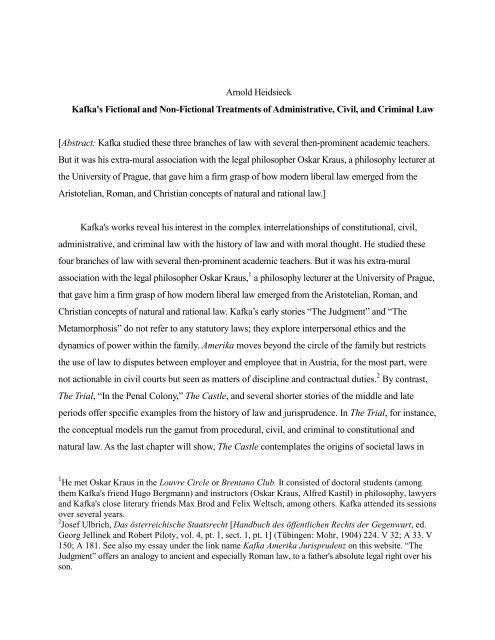
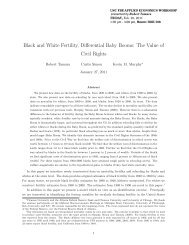

![15. RS 1.003 (RaJsu-yeni - nql?) RS 18.056 (RaJsu-yeni -5'[ ... ])](https://img.yumpu.com/51622603/1/189x260/15-rs-1003-rajsu-yeni-nql-rs-18056-rajsu-yeni-5-.jpg?quality=85)
